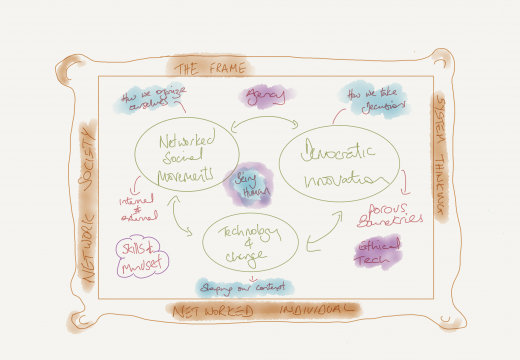
These are my notes on the session I pitched at UKGC16 on the relationship between networks and system change. I tend to use these sessions to work on problems which I am currently thinking about and at the moment I am spending a lot of time thinking about how to drive system change. My fairly simple model is shown at the top of the post. Huge thanks to the govcamper who did the notes – I have quoted heavily from these! Thanks also to Gaia for providing a quick explanation of the basics of network theory.
I opened by posing a question:
Do you believe that you can curate a network to bring about system change, or should you leave it and let it form itself?
As a starting point our working definition of a network ‘was a group of people brought together with a sense of trust and common purpose’. That purpose in this context is a desire for systemic change. That being said, there is a real need for people to expose themselves to people who are different to them, in order not to become part of an echo chamber. Twitter was cited as a really good example of this, which was also used by most participants.
There was some debate around whether or not you can ‘control’ a network. My view is that it is more about curating a network rather than controlling it. There is a whole other blogpost (and more more) in the term ‘curation’ in this context. However there was broad agreement that networks need someone (or a small group) at the heart of the network to bring it together. Part of this role is about helping to bring people together around definitions or form a common understanding around issues.
This role of curator was observed as one which every organisation increasingly values, yet very few actually pay for or formally recognise. Lots to think about here around how you develop into a 21st Century workforce and the skills you need – I will be doing some more in-depth work on this this year
There was a lot of interesting discussion about the relationship between networks and hierarchies – the group strongly made the point that when well aligned networks and hierarchies can work together to effect system change. As a side note I think this is another indication of the maturity of the digital discussion within this space which I noted in my ukgc16 post.
There was a lot of agreement around the need for generosity and reciprocity – the social side of socio-technical system change. Interestingly there was also general agreement around the need for safe spaces to work on problems – interestingly a lot of commonality between the qualities of these and the civic space affordances I have written about elsewhere so that is something I will work more on this year as well.
At the centre of this conversation is the question of purpose – and specifically how and who defines it. In a networked context purpose is fluidly and constantly negotiated (as an extreme case look at the Occupy movement) but this is a subtle business when we look at the interplay between networks and hierarchy which was highlighted in the session. The connectors/convenors who were discussed in the session are critical to this but perhaps we should be looking at the people who hold this position across hierarchies and networks in order to understand this more. As a next strand of this thinking I’ll be considering how these networked leaders could/should participate in the safe spaces which are needed to work on problems.
As ever thanks for everyone for their contributions to the session – as ever it has shifted and I hope improved my thinking.



Adrian McEwen
Sounds (from this and links from your last post) like UKGC16 was really good.
I’m with you in thinking that the network is less likely to effect change on its own, although curation still feels a bit too controlled a term.
I tend to feel like I’m trying to influence and shape the culture of the group, rather than curate it. And the ways I do that are through my actions as a member of the group (the “be the change you want to see” approach); trying to consciously champion/ignore/call-out the good/undesirable/toxic behaviour in others; and thinking up actions/experiments/initiatives which nudge the culture in the direction I want it to head.
There’s a bit more on my thinking around this in a blog post I wrote a while back – http://www.mcqn.net/mcfilter/archives/thinking/growing_a_culture.html
curiouscatherine
It was excellent – recommend it for next year! I think the world curation really needs some unpacking as I am also thinking of it in terms of influence and culture and I agree it needs to be shown not talked about. Have added you blog to my reading list for the train tomorrow – thanks!
cactimick
Great question that got me thinking about ‘curating’, and wondering if the principles of participative action research (PAR) shed further light on who defines the boundary and who leads the research….
curiouscatherine
Yes! PAR is VERY much in my mind and shaping this thinking – I’m going to try and insert some action learning sets into the model with a view to seeing if we can use these to develop some PAR principles alongside. Will blog more!
PS Lovely to hear from you – hope all is well!